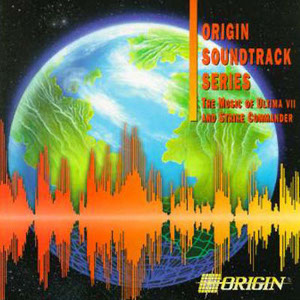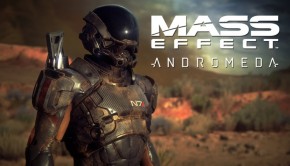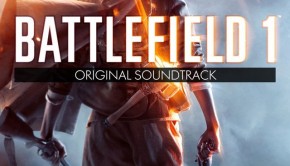Origin Soundtrack Series Vol. 2
 |
Album Title: Origin Soundtrack Series Vol. 2 |
| Record Label: Electronic Arts |
|
| Catalog No.: N/A |
|
| Release Date: 1993 |
|
| Purchase: Buy Used Copy |
Overview
For many gamers and reviewers, Ultima VII: The Black Gate, released in 1992, marks the high point of the venerable franchise, and of the whole genre of computer RPGs (and also the last great Ultima game before the series went into decline with Ultima VIII: Pagan). Offering previously unseen interactivity that let players manipulate almost every object on the screen that wasn’t nailed to the ground, and featuring a remarkably open-ended game world, the title was the culmination of the series’ long-standing ambition to create a living, breathing fantasy world for players to freely explore. In this regard, Ultima VII is a direct predecessor to the free-roaming structure of the Elder Scrolls series. Ultima VII‘s success led to the development of two expansions and one sequel, Ultima VII: The Serpent Isle, and to the release of two ports for the SNES and the PSP. Another game by Origin Systems released a year later had a more problematic history and reception. Strike Commander was Chris Roberts’ next project after the first two Wing Commander games, but while the combat flight simulator’s 3D graphics-engine produced impressive results, the developers’ ambitions to push the technological envelope caused the game to be delayed by a whole two years.
The first compilation of music from Origin Systems’ games – pragmatically called Origin Soundtracks – had been an unofficial release, put together in 1991 by veteran composer Martin Galway and likely functioning as some sort of giveaway. The story behind Origin Soundtrack Series Vol. 2 – The Music of Ultima VII and Strike Commander proves more interesting. To underline Origin’s aim of creating games with cinematic ambitions and polish, Ultima VII: The Black Gate‘s developers designed the game’s credits roll in the style of a movie – including the line “Soundtrack available from Origin”. According to legend, what was supposed to be an injoke backfired when the company was inundated with calls from fans who now wanted to buy the game’s soundtrack. It seems that the fans’ requests were numerous enough for the developers to announce in the credits of Ultima VII: The Serpent Isle “Soundtrack NOT available – so DON’T ASK!”. Thankfully, soon after Origin relented and in 1993 released an album containing music from The Black Gate and The Serpent Isle, as well as from Strike Commander. Available from Electronic Arts – who had just bought Origin – Origin Soundtrack Series Vol. 2 was one of the very first widely available and dedicated commercial album releases of Western game music.
Body
The immense scope of the two Ultima VII games was mirrored in its music, which amounted to about 50 minutes of material – far more than what had been written for any other previous Ultima game. Origin Soundtrack Series Vol. 2 presents approximately 30 minutes of music, gathered from both games. The album leaves out the majority of insubstantial pieces, doing as a good a job as one could hope for in presenting all noteworthy music from these titles (referred to throughout the review simply as Ultima VII). Singling out individual composers’ achievements on Ultima VII is difficult, as a total of seven artists – including series returnees Herman Miller and David R. Watson – contributed to Ultima VII‘s music.
Ultima VI: The False Prophet, as presented on Origin Soundtracks, featured a mostly dull score that only occasionally managed to underpin its melancholy mood with anything of musical substance. Ultima VII recalls its predecessor’s wistfulness and intimate atmosphere on many occasions, but turns out to be a much more engrossing listening experience, making its mark through greater melodic strength and emotional depth. Whereas Ultima VI‘s atmosphere rarely changed, Ultima VII manages to wring a lot more variety out of similarly light orchestrations, as nicely evidenced by a pair of contrasting tracks such as “Chamber Music / Love Theme / Passion Play” and “Ghost”. “Chamber Music / Love Theme / Passion Play” opens with a lovely flute lead that is melodically stronger than almost anything on Ultima VI, backed by harp and gently persisting strings. The music segues into the slightly saccharine love theme, but even the candy-coated glockenspiel in the background doesn’t change the fact that the music remains pretty. The piece then ends with a medieval dance imitation that back in 1992 was still a relatively fresh idea for an RPG score. At the other end of the spectrum lies “Ghost”, whose tinkling, metallic opening lead eerily wanders back and forth across the stereo field in its chromatic progression. The following woodwind melodies are suitably unsettling and made more unnerving by the hushed accompaniment consisting of string pizzicati and music box-like sounds. “Ghost”s ingredients are standard material of ‘haunted house’-style horror music, but not only are they deployed effectively and with skill on Ultima VII. Their use – and that of many other atmospheric sounds of various kinds – also heralds the first numbered Ultima score that is varied enough to satisfyingly portray a fantasy world of significant scope.
Other tracks follow the same stylistic path, while adding some well-implemented changes to the formula. “Torture / Wall Of Lights”’ initial sense of mystery comes courtesy of its plucked lead and a woodwind solo, set against a chiming instrumental background, before the ethereal solo harp takes over while accompanied by synth fanfares, timpani strokes and string hits. It’s an effective contrast that gives the calmly floating music more breadth and authority. “Torture / Wall of Lights”’ tendency towards mysticism is also found on “Conversation With Gwenno”, if in less creative form and through relatively sparse orchestrations that are Ultima VII‘s most obvious throwback to its predecessor. Series’ stalwart “Stones” receives its best arrangement so far on Ultima VII, in a rendition that emphasises both the composition’s light-heartedness (string pizzicati) and its subtle and peaceful nature, which is articulated through the echoey acoustics of the lead melody line and the floating violin chords in the background.
While Ultima VII continues its successor’s inclination for airy sounds – albeit through more intricate compositional means – the game ventures further out and dabbles in many other moods, making Ultima VII the most multi-faceted numbered Ultima score to date. It also comes close to rivalling previous series champion Ultima: Worlds of Adventure 2: Martian Dreams for the crown of the overall best Ultima score (before George Oldziey’s Ultima IX: Ascension arrived in 1999, that is). Most intriguing among this crop of more earth-bound cues on Ultima VII are “Bane’s Theme / Shamino The Amoral” and “Monks’ Theme / Fellowship Theme”. The first cue introduces cheeky interlocking woodwind figures to portray mischievous, shady characters, while an underlying, pompously strutting double bass and timpani rhythm hints at comedy. In its balance between menace and playfulness, “Bane’s Theme / Shamino The Amoral” is one of the album’s most emotionally complex tracks and feels like a mellower precursor of Final Fantasy VI‘s brilliant“Cefca”. “Monks’ Theme / Fellowship Theme” is convincingly majestic and ecclesiastic through its use of synth choir and solemn organ chords, segueing seamlessly into the equally noble Fellowship theme, which features some nice woodwind counterpoint and ends on a welcome symphonic note, bolstered by bell strikes.
Other location or mood setters are more traditional, but still make the necessary impact. “Great Earth Serpent’s Theme / Batlin’s Theme” continues “Ghost”’s ominous strains with its oppressive and ambient mood, while containing sufficient melodic elements to maintain interest. “Dupré’s Theme / Love (A Virtue)” is a string adagio that’s among Ultima VII‘s most emotionally potent compositions, moving from the sorrow of Dupré’s tragic theme into more peaceful pastures halfway through. A somewhat lesser piece that nonetheless adds new colours to the world of Ultima VII is “Fortune Teller / Seedy Bar / Camping”. A bit clichéd in the depiction of its subjects (Carnevalesque ¾ metre and secretive woodwind melody for the fortune teller, simple sing-along melody and rhythm for the tavern), the piece still ends amicably with the tranquil strains accompanying the heroes’ camping site. It’s worth noting how well all these pieces flow, considering that most of them are suites consisting of shorter compositions. Different to Origin Soundtracks, these suites now have their tracks convincingly segueing into each other.
The only moments when Ultima VII misses the mark are during its action tracks, which unfortunately bookend the album’s selection of music from the game. “Ultima VII / Serpent Isle Combat” combines the battle music from the two Ultima VII games into one medley, but opens the album on a less then invigorating note. “Ultima VII / Serpent Isle Combat” begins with material that despite its synth hits and persistent bass pulse never develops much drive, partly due to a lack of inspiring melodies. The cue’s calmer mid-section, which includes a folksy flute solo, is more convincing though, and after this brief bit of Medieval period touch, the track presents its opening material in a more agitated and energetic manner, although it’s still nothing to get enthusiastic about. “Dragon’s Flight”’s beginning is Ultima VII‘s most vivacious moment and certainly exceeds “Ultima VII / Serpent Isle Combat” in terms of energy. Sadly though, the piece never quite takes off in the way its opening promises and instead simply sticks to adding standard brass progressions, fanfares and escalating, tense motifs on top of the empowering rhythm work.
Moving on to Strike Commander – due to the game’s relative obscurity almost twenty years after its release, its inclusion on the album may feel a bit like an afterthought in retrospect, but one should remember that this was one of Origin’s biggest 1993 titles. The game’s music was written by a team of composers including Dana Glover, Nenad Vugrinec (the two had previously worked on Wing Commander II: Vengeance of the Kilrathi), Randy Buck and Marc Schaefgen. Of the game’s 60 minutes of music, 19 made it onto Origin Soundtrack Series Vol. 2. Like the Wing Commander games, Strike Commander used in-game cut-scene animations to tell its storyline, continuing Chris Roberts’ ambition to turn his games into movie-like storytelling vehicles.
That same aspiration also finds its way into Strike Commander‘s music, which takes inspiration from air-bound action movies of the mid-80s to early 90s and their mix of synth stylings, rock elements and (synth) orchestral sounds. The two pieces which open and close Strike Commander‘s selection of music interestingly showcase both the best and worst that this approach can yield. Opening track “Strike Commander Combat (Fledgling)” cranks up the tension right away with echoing cymbal crashes and determined melodies, before the piece segues into a section marked by its synth pulse and a driving staccato guitar motif, doubtlessly depicting fighter places taking off. Running close to five minutes, “Strike Commander Combat (Fledgling)” is a seamlessly swelling and ebbing tension-builder that can raise a good ruckus – particularly during the electro/orchestral build up after 3:10 – and remembers to throw in some dauntless, inspiring synth motifs when necessary. The opposite to this flawlessly developed piece of fighting spirit and heroic cool is “Closing Theme”, a soft rock-inspired album closer that is modelled on the credit roll pop ballad-format of many 80s action movies. Unfortunately, “Closing Theme” is mostly devoid of any memorable melodic hooks or other worthwhile features and makes for a regretfully forgettable finale to Origin Soundtrack Series Vol. 2.
Between these two tracks, listeners finds four compositions that are far less action-packed then one might expect from a game that involves a group of jet plane-flying mercenaries called ‘Wildcats’. Instead, this music seems to score the locations from which the ‘Wildcats’ take off to embark on their missions. While these cues are frequently too brooding to be entirely interesting, this downside is balanced by the surprisingly frequent use of ethnic sounds. “Selim’s Bar” and “Desert Strike Base” introduce Middle-Eastern instruments and scales – although “Selim’s Bar” only uses these elements intermittently, remaining rather nondescript in its reliance on rambling low strings, hand percussion and a tinkling piano melody. “Desert Strike Base” is a more satisfying attempt at such ethnically-inspired writing, as the cue’s Middle-Eastern scales give the meandering music a certain degree of evocative colour, while the piece manages to retain some measure of militaristic tension that stops the track from becoming mere underscore.
“Jungle Strike” and “Columbia USA”, on the other hand, introduce tribal elements, such as South American percussion elements and echoing ethnic woodwind calls. Again, it’s important to remember that these ethnic sounds, while hardly original from today’s perspective, were still relatively new in 1993. This was partially because until some years prior, technologically limited chip synthesis didn’t allow for the reasonably faithful reproduction of these non-standard (from a Western point of of view) instruments. Neither “Jungle Strike” nor “Columbia To USA” do miracles with their South American-flavoured sounds, but “Jungle Strike”’s soothing second half that’s only comprised of nocturnal synth motifs, gentle percussion and nature sound effects is a nice surprise. “Columbia To USA”’s first half returns the ‘jungle’ elements against a tenser synth and percussion background that includes drum pads, but this effective build up of tension only segues into a vanilla second half packed with staccato synth hits that are supposed to sound bold, but instead feel hackneyed.
Summary
Origin Soundtrack Series Vol. 2 is an immense improvement over its predecessor, which suffered from its source material’s uneven quality. Having raided its back catalogue with Origin Soundtracks,this time Origin focuses on music from only two games, which makes for a more coherent listening experience. What’s most important though is the simple fact that Ultima VII, which occupies the majority of the album, features the best score of any numbered Ultima game up to that point. While preserving Ultima VI: The False Prophet‘s intimate and peaceful nature, Ultima VII greatly expands upon that earlier game’s limited emotional and timbral expression, featuring a score that for the first time in the history of numbered Ultima games is befitting of the game’s scope. At turns soothing, majestic, ominous and otherworldly, and usually supported by sufficiently strong, if not outstanding melodic material, Ultima VII is a solid fantasy score that exceeds other contemporary rivals within its genre (such as The Dark Eye and Might & Magic).
The potential hidden in Strike Commander‘s fusion of genres (electro, orchestral, rock and ethnic) isn’t fully realised in the pieces featured on Origin Soundtrack Series Vol. 2, with a trite light rock piece closing the album, while other pieces rely more on atmospheric brooding than necessary. However, the South American and Middle-Eastern instruments and scales bring welcome variety to the music and are usually well-integrated, while “Strike Commander Combat (Fledgling)” successfully realises the game’s movie-inspired storytelling aspirations. All things told, Origin Soundtrack Series Vol. 2 is an enjoyable trip into the early days of Western game music, although it still ranks second to its successor Origin Audio CD Volume 3.
Do you agree with the review and score? Let us know in the comments below!
4
Posted on June 15, 2014 by Simon Elchlepp. Last modified on June 15, 2014.














